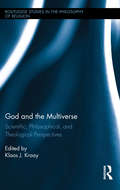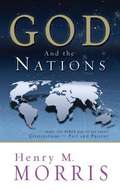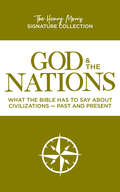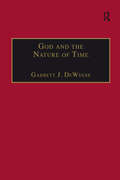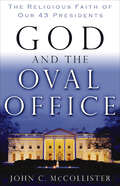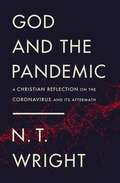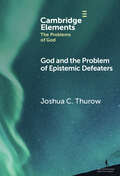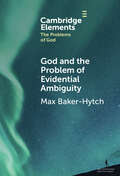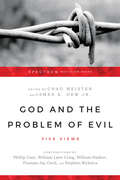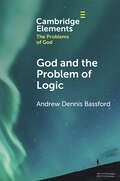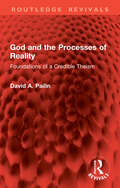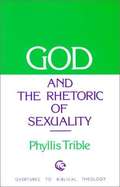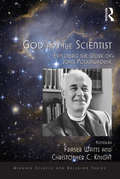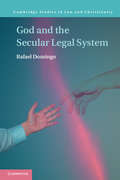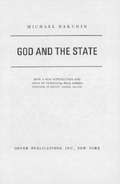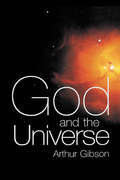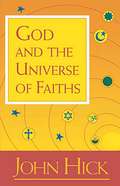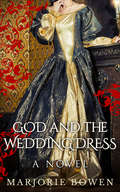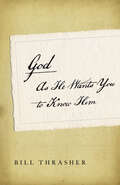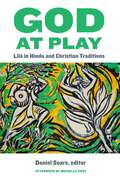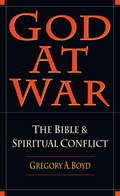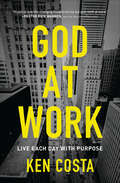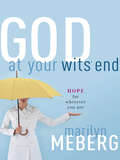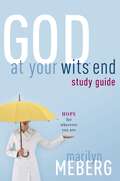- Table View
- List View
God and the Multiverse: Scientific, Philosophical, and Theological Perspectives (Routledge Studies in the Philosophy of Religion)
by Klaas KraayIn recent decades, scientific theories have postulated the existence of many universes beyond our own. The details and implications of these theories are hotly contested. Some philosophers argue that these scientific models count against the existence of God. Others, however, argue that if God exists, a multiverse is precisely what we should expect to find. Moreover, these philosophers claim that the idea of a divinely created multiverse can help believers in God respond to certain arguments for atheism. These proposals are, of course, also extremely controversial. This volume collects together twelve newly published essays – two by physicists, and ten by philosophers – that discuss various aspects of this issue. Some of the essays support the idea of a divinely created multiverse; others oppose it. Scientific, philosophical, and theological issues are considered.
God and the Nations
by Dr Henry M. MorrisBehold, the nations are as a drop of a bucket, and are counted as the small dust of the balance...Isaiah 40:15 A fascinating title from creationist icon Henry Morris Perfect for Christians who focus on apologetics Focuses on a rare, but important topic: God's plan for individual countries In the Bible, we see the interest God has in humans and their cultures. In the Old and New Testaments, the Hebrew and Greek words for "nations" occurs 720 times. Many of the nations that were given land and resources during Bible times have now passed into history, such as the Assyrians, Babylonians, and Hittites. We also know from secular history that civilizations like the Aztecs and Greeks are also largely removed from the scene. All this is due to those nations rejection of God's laws. Indeed, of the 200 nations in existence today, only a handful actively seek God.
God and the Nations: What the Bible has to say about Civilizations - Past and Present (The Henry Morris Signature Collection)
by Henry MorrisDespite living in a very connected world today, few of us have any real understanding of the history of nations. Secular scholars and scientists from various fields rarely consult the Bible’s rich history on the subject. Yet if we consider what the Bible has to say about the global community’s past—and future—achievements and mistakes, we discover a saga as fascinating as anything produced in Hollywood. In God & the Nations, Dr. Henry Morris does an unusual thing: he shows clearly that God is even more interested in the fate of each person as He is about the unfolding of national stories. Additionally, he delves into the mysterious world of Bible prophecy to proclaim the God of the Bible as truly unique. Morris, through this study of civilizations, reveals the origins and purpose for the whole world!
God and the Nature of Time (Routledge Philosophy of Religion Series)
by Garrett J. DeWeeseIs God temporal, 'in time', or atemporal, 'outside of time'? Garrett DeWeese begins with contemporary metaphysics and physics, developing a causal account of dynamic time. Drawing on biblical material as well as discussions of divine temporality in medieval and contemporary philosophical theology, DeWeese concludes that God is temporal but not in physical time as we measure it. Interacting with issues in the history of philosophy, contemporary philosophy of science, and philosophy of religion, this book offers students a thorough introduction to the key issues and key figures in historical and contemporary work on the philosophy of time and time in theology.
God and the Oval Office: The Religious Faith of Our 43 Presidents
by John C. McCollisterA look into how the temporary residents of the White House expressed the deepest of all human feelings—personal religious faith—in their own words.“We need to remember that the separation of church and state must never mean the separation of religious values from the lives of public servants.” —Lyndon B. Johnson“So help me God.” George Washington added those words to the presidential oath, and every president since has followed suit. Whether their faith was devout or doubted, heartfelt or pragmatic, John McCollister plumbs America’s strong and deep spiritual heritage, showing the fascinating and vital role faith played in the lives of each of our forty-three presidents:Thomas Jefferson’s “edited” version of the GospelsAbraham Lincoln’s unique approach to organized religionAndrew Johnson’s “secret” CatholicismJames Garfield’s personal sacrifice of the pulpit for the presidencyDwight Eisenhower’s trust in God’s sovereigntyRonald Reagan’s profound sense of forgivenessGeorge W. Bush’s unapologetic faith in Jesus ChristFrom George Washington to George W. Bush, most of our country’s chief executives have turned to God for assurance, guidance, and hope. Through what they learned in the Bible, bolstered by strength found in prayer, they have led America to become the greatest nation on earth. Timely and timeless, God and the Oval Office tells their story.
God and the Pandemic: A Christian Reflection on the Coronavirus and Its Aftermath
by N. T. WrightDiscover a different way of seeing and responding to the Coronavirus pandemic, an approach drawing on Scripture, Christian history, and the way of living, thinking, and praying revealed to us by Jesus.What are we supposed to think about the Coronavirus crisis?Some people think they know: "This is a sign of the End," they say. "It's all predicted in the book of Revelation."Others disagree but are equally clear: "This is a call to repent. God is judging the world and through this disease he's telling us to change."Some join in the chorus of blame and condemnation: "It's the fault of the Chinese, the government, the World Health Organization…"N. T. Wright examines these reactions to the virus and finds them wanting. Instead, he shows that a careful reading of the Bible and Christian history offers simple though profound answers to our many questions, including:What should be the Christian response?How should we think about God?How do we live in the present?Why should we lament?What should we learn about ourselves?How do we recover?Written by one of the world's foremost New Testament scholars, God and the Pandemic will serve as your guide to read the events of today through the light of Jesus' death and resurrection.
God and the Problem of Epistemic Defeaters (Elements in the Problems of God)
by Joshua ThurowAny modern, moderately intellectually mature (MMIM) believer in God faces a variety of epistemic defeaters of their belief in God. Epistemic defeaters challenge the rationality of a belief. After explaining the notion of a defeater and discussing various ways and targets of defeat, this Element categorizes the many defeaters of belief in God into four classes: rebutting, undercutting, base defeaters, and competence defeaters. Then, several general defeaters of theistic belief are examined in some detail: the superfluity argument, the problem of unpossessed evidence, various forms of debunking arguments, and a cumulative case competence defeater. The typical MMIM believer, it is argued, has resources to resist these defeaters, although the cumulative case competence defeater has some force. The strength of its force depends on the strength of grounds for theistic belief and of various defeaters and deflectors for the competence defeater. No easy general defeater of theistic belief is found.
God and the Problem of Evidential Ambiguity (Elements in the Problems of God)
by Max Baker-HytchWhen it comes to what many of us think of as the deepest questions of existence, the answers can seem difficult to make out. This difficulty, or ambiguity, is the topic of this Element. The Element begins by offering a general account of what evidential ambiguity consists in and uses it to try to make sense of the idea that our world is religiously ambiguous in some sense. It goes on to consider the questions of how we ought to investigate the nature of ultimate reality and whether evidential ambiguity is itself a significant piece of evidence in the quest.
God and the Problem of Evil: Five Views (Spectrum Multiview Book Series)
by Chad Meister James K. Dew Jr.Evil abounds. And so do the attempts to understand God in the face of such evil.God and the Problem of EvilPhillip Cary: A Classic ViewWilliam Lane Craig: A Molinist ViewWilliam Hasker: An Open Theist ViewThomas J. Oord: An Essential Kenosis ViewStephen Wykstra: A Skeptical Theism ViewGod and the Problem of Evil
God and the Problem of Logic (Elements in the Problems of God)
by Andrew Dennis BassfordClassical theists hold that God is omnipotent. But now suppose a critical atheologian were to ask: Can God create a stone so heavy that even he cannot lift it? This is the dilemma of the stone paradox. God either can or cannot create such a stone. Suppose that God can create it. Then there's something he cannot do – namely, lift the stone. Suppose that God cannot create the stone. Then, again, there's something he cannot do – namely, create it. Either way, God cannot be omnipotent. Among the variety of known theological paradoxes, the paradox of the stone is especially troubling because of its logical purity. It purports to show that one cannot believe in both God and the laws of logic. In the face of the stone paradox, how should the contemporary analytic theist respond? Ought they to revise their belief in theology or their belief in logic? Ought they to lose their religion or lose their mind?
God and the Processes of Reality: Foundations of a Credible Theism (Routledge Revivals)
by David A. PailinCan belief in God be rational? David A. Pailin identifies the reasons behind this questioning of theistic faith in his book God and the Processes of Reality (originally published in 1989) and demonstrates how the supposed incoherences in the concept of God are due to the generalization of partial insights. He establishes the basic character of the concept of God, and examines the nature of the major attributes of the divine and of the relationship of God to the processes of reality, looking at God as creator, the relation of God to historical events, and the role of God as the basis for individual fulfilment.The book takes up many of the insights developed by Whitehead and Hartshorne in what is commonly known as process thought. Pailin explains these insights and counters common misapprehensions about them critically, sometimes radically so, to present a credible understanding of the God of theistic belief and a coherent understanding of the relationship of that God to the processes of reality. This book will be of interest to students and researchers of religion and philosophy.
God and the Rhetoric of Sexuality
by Phyllis TribleFocusing on texts in the Hebrew Bible, and using feminist hermeneutics, Phyllis Trible brings out what she considers to be neglected themes and counter literature. After outlining her method in more detail, she begins by highlighting the feminist imagery used for God; then she moves on to traditions embodying male and female within the context of the goodness of creation. If Genesis 2-3 is a love story gone awry, the Song of Songs is about sexuality redeemed in joy. In between lies the book of Ruth, with its picture of the struggles of everyday life.
God and the Scientist: Exploring the Work of John Polkinghorne (Routledge Science and Religion Series)
by Fraser WattsThis book presents a celebration, survey and critique of the theological work of arguably the most important and most widely-read contributor to the modern dialogue between science and theology: John Polkinghorne. Including a major survey by Polkinghorne himself of his life's work in theology, this book draws together contributors from among the most important voices in the science-theology dialogue today to focus on key aspects of Polkinghorne's work, with Polkinghorne providing responses. Anybody exploring contemporary aspects of the science-religion debate will find this book invaluable.
God and the Secular Legal System
by Rafael DomingoThis timely book offers a theistic approach to secular legal systems and demonstrates that these systems are neither agnostic nor atheist. Critical but succinct in its approach, this book focuses on an extensive range of liberal legal approaches to religious and moral issues and subjects them to critical scrutiny from a secular perspective. Expertly written by a leading scholar, the author offers a rare combination of profundity of ideas and simplicity of expression. It is a ringing defense of the theistic conception of secular legal systems and an uncompromising attack on the agnostic and atheist conception.
God and the State (Select Bibliographies Reprint Ser.)
by Michael BakuninA founder of modern philosophical anarchism presents a clear introduction to anarchist thought and a manifesto of atheism. Bakunin offers a mind-opening experience for even the most skeptical readers. This influential work denounces religion as a weapon of the state that must be smashed in the pursuit of the right to self-determination.
God and the Universe
by Arthur GibsonAmbitious, controversial and absorbing, God and the Universe tackles the highly-charged issue of God's relevance in the light of new scientific thinking on cosmology. Engaging with poststructuralism, ethics, mathematics, and philosophy through the ages, this persuasively argued book reinvigorates religious debate for the new millennium.
God and the Universe of Faiths: Essays In The Philosophy Of Religion
by John HickThis accessible text tackles the major issues challenging contemporary Christian belief to produce a controversial conception both of Christianity and of the wider religious life of humanity.
God and the Wedding Dress: A Novel
by Marjorie BowenThe prolific author of A Knight in Spain presents a gripping work of historical fiction set during the Great Plague of London. In a remote Derbyshire village, over three hundred years ago, a man tried to serve his God to the best of his belief . . . but at a terrible cost to himself and others. William Mompesson is the new rector of Eyam. He is young, handsome, and has a lovely family. Life is too easy in the countryside, as his wife and children enjoy his generous income and the apathetic locals do not require much spiritual guidance. Mompesson’s greatest daily challenge is for the souls of his parishoners, as paganism and the famous dissenter Thomas Stanley vie for the attention of the people. But he soon faces a great test as the Plague comes to town, possibly in the crate with his sister-in-law’s wedding dress from London. As his parishioners die one after another, Mompesson is witness to unbelievable horrors that test his faith in God—and inspirational acts of heroism and sacrifice. “A quieter, more reflective novel, as much about a man’s inner struggles as it is about the history surrounding him . . . A fascinating story.” —She Reads Novels
God as He Wants You to Know Him
by Bill ThrasherEvery believer has a need for an understanding of systematic theology, but very few theology books present material in a personal, devotional format that appeals to th most popular level of believers. Dr. Thrasher manages to communicate the most academic biblical truth with the heart and personal connection of a pastor, achieving a depth of knowledge at an extremely approachable level. It's the astute wisdom of a professor packaged in the comfortable relatability of a friend.
God as He Wants You to Know Him
by Bill ThrasherEvery believer has a need for an understanding of systematic theology, but very few theology books present material in a personal, devotional format that appeals to th most popular level of believers. Dr. Thrasher manages to communicate the most academic biblical truth with the heart and personal connection of a pastor, achieving a depth of knowledge at an extremely approachable level. It's the astute wisdom of a professor packaged in the comfortable relatability of a friend.
God at Play: Līlā in Hindu and Christian Traditions (Comparative Theology: Thinking Across Traditions)
by Daniel SoarsThe first comparative treatment of the topic of līlā in Hindu and Christian traditions, this volume explores what it means to consider divine and human action under the categories of play, wit, drama, grace, and compassionGod at Play presents a theological exploration of the multifaceted motif of līlā across diverse Hindu and Christian landscapes and its wide-ranging connections to divine and human creativity. Given its ubiquity in Hindu theologies and life-forms, līlā offers a rich comparative framework for exploring certain ways of understanding divine and human action as expressed in Hindu and Christian sacred texts, philosophical theology, and ritual practices.Though līlā is often interpreted simply as “play,” the essays in this volume reflect a far richer semantic and conceptual field, ranging from spontaneity and gratuitousness, through joy and humor, to mercy and compassion. By focusing on the different contexts in which līlā is found in Hindu traditions and resisting any uniform translation of the term, the contributors to this volume avoid the risk of using predominantly western or Christian categories to understand the Hindu other. The volume thus explores how līlā functions in a variety of distinctive philosophical, theological, and devotional ways across Hindu traditions, and listens for echoes in Christian understandings of the gratuitousness of the created order in relation to God.God at Play is a genuine experiment in deep learning across traditions. Each chapter reflects on what is learned by taking līlā as the category of comparison and invites the reader to think about what these conversations add, confirm, or change in relation to earlier twentieth-century scholarship on play—not least, in terms of what difference it might make to understand human life as an imitation and a participation in the divine life of a playful deity.
God at War: The Bible Spiritual Conflict
by Gregory A. BoydIn this bold and compelling work, Gregory Boyd undertakes to reframe the central issues of Christian theodicy. By Boyd's estimate, theologians still draw too heavily on Augustine's response to the problem of evil, attributing pain and suffering to the mysterious "good" purposes of God. Accordingly, modern Christians are inclined not to expect evil and so are baffled but resigned when it occurs. New Testament writers, on the other hand, were inclined to expect evil and fight against it. Modern Christians attempt to intellectually understand evil, whereas New Testament writers grappled with overcoming evil. Through a close and sophisticated reading of both Old and New Testaments, Boyd argues that Satan has been in an age-long (but not eternal) battle against God, and that this conflict "is a major dimension of the ultimate canvas against which everything within the biblical narrative, from creation to the eschaton, is to be painted and therefore understood." No less edifying than it is provocative, God at War will reward the careful attention of scholars, pastors, students and educated laypersons alike.
God at Work: Live Each Day with Purpose
by Ken CostaGod calls us to the work we are doing. He&’s interested not only in what we do, but how we do it. Yet, finding purpose at work is one of the greatest challenges of our world today.Does my work matter to God? Is ambition good? How do I deal with failure? How do I make difficult decisions?Ken Costa shares his practical insights and experience gained from more than forty years working in finance. This timeless message, that there is space for faith at work, will truly inspire you to live each day with purpose.
God at Your Wits' End
by Marilyn MebergThe good news about being at our wits' end is that God meets us there. To be human is to spend some time at our wits' end?in confusion, desperation, pain, and fear. In that difficult place, we long for a tangible, visible sign that God hears our cries and is actively working for good in our lives. But all too often, faulty thinking erodes our faith and alters our beliefs, causing us to ask; If He loves me so much, why do I hurt so much? Am I being punished? I thought I was forgiven. Why is faith so hard? What if I don't have enough? Why does God allow suffering? In God at Your Wits' End, Marilyn Meberg helps us cut through the mental clutter and confusion that lead to faulty thinking and shaky faith. She tenderly acknowledges our trials by revealing her own wits'-end experiences; then she points the way to rescue and respite by sharing the scriptural truths of God's enduring love and sovereign power.
God at Your Wits' End Study Guide: Hope for Wherever You Are
by Marilyn MebergCornered. Boxed in. On our last leg. In a pickle. Between a rock and a hard place. Sitting on a powder keg. Out of options. No where to turn. At the end of our rope. At our wits' end.Life often sends us to our wits' end, with our backs against a wall and no idea how to escape. At times like these, there's a battle going on between our head and our heart. In our hearts we believe God loves us, but in our heads we struggle with tough questions.If He loves me so much, why do I hurt so much?Am I being punished? I thought I was forgiven.Who's in charge of my life? Can I trust that answer?Why is faith so hard? What if I don't have enough?This study guide features:8 LessonsScripture-focused insightful studyEvaluation of your strengths and weaknesses regarding faithSpace to journal your personal thoughts and attitudes about faithThis study has been prepared with the single or small group study in mind, allowing you to build your faith and experience a refreshing hope in God.
